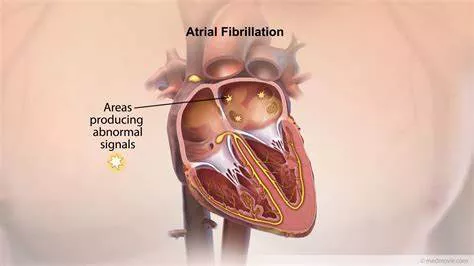Atrial fibrillation (AFib) is a common heart condition characterized by an irregular and often rapid heartbeat. This can lead to various complications, including blood clots, stroke, heart failure, and other heart-related problems. Managing AFib involves a combination of lifestyle changes, medications, and sometimes medical procedures.
What You Should Do If You Have Atrial Fibrillation
Limit Caffeine and Alcohol Intake
Caffeine and alcohol can trigger AFib episodes. While moderate consumption may be safe for some individuals, it is essential to monitor your body’s response and consult with your healthcare provider. Excessive caffeine can increase heart rate and potentially lead to irregular rhythms. Similarly, alcohol, especially in large quantities, can have a direct impact on the heart’s electrical system, increasing the risk of AFib.
SEE ALSO: what symptoms can be associated with sinus bradycardia
Avoid High-Sodium Foods
A diet high in sodium can lead to hypertension (high blood pressure), which is a significant risk factor for AFib. Processed and packaged foods often contain high levels of sodium. To manage AFib effectively, focus on a heart-healthy diet rich in fruits, vegetables, whole grains, and lean proteins while reducing salt intake.
Steer Clear of Energy Drinks
Energy drinks contain high levels of caffeine and other stimulants that can exacerbate AFib symptoms. They can increase heart rate and cause palpitations, making them particularly risky for individuals with AFib. Avoiding these beverages can help maintain a stable heart rhythm.
Avoiding Stress and Overexertion
Manage Stress Levels
Chronic stress and anxiety can negatively affect heart health and potentially trigger AFib episodes. Practicing stress management techniques such as meditation, yoga, deep breathing exercises, and mindfulness can be beneficial. Regular physical activity, adequate sleep, and seeking support from friends, family, or a mental health professional are also effective ways to manage stress.
Avoid Overexertion
While regular exercise is beneficial for heart health, overexertion can lead to adverse effects. High-intensity workouts can strain the heart and potentially trigger AFib episodes. It is essential to find a balance and engage in moderate, regular physical activity tailored to your fitness level and medical condition. Activities like walking, swimming, and cycling can be excellent choices. Always consult with your healthcare provider before starting any new exercise regimen.
Medication Management
Do Not Skip or Change Medication Without Consultation
Medications play a crucial role in managing AFib, controlling heart rate, and reducing the risk of stroke. It is vital to take prescribed medications as directed and not to skip doses or make any changes without consulting your healthcare provider.
Abruptly stopping or altering medications can lead to serious health complications.
Avoid Over-the-Counter Medications and Supplements Without Approval
Some over-the-counter medications and supplements can interfere with AFib management or interact with prescribed medications. For example, certain cold and allergy medications contain stimulants that can trigger AFib. Always check with your healthcare provider before taking any new medications or supplements.
Lifestyle And Environmental Factors
Avoid Smoking
Smoking is detrimental to heart health and can exacerbate AFib symptoms. The chemicals in tobacco smoke can damage the heart and blood vessels, increasing the risk of irregular heartbeats. Quitting smoking is one of the most significant steps you can take to improve your overall heart health and manage AFib.
Limit Exposure to Environmental Pollutants
Air pollution and exposure to toxic chemicals can negatively impact heart health and potentially trigger AFib episodes.
Limiting exposure to pollutants, using air purifiers, and avoiding areas with high levels of pollution can be beneficial.
Avoid Excessive Heat and Dehydration
Extreme heat and dehydration can strain the heart and lead to electrolyte imbalances, increasing the risk of AFib. Staying hydrated and avoiding prolonged exposure to high temperatures can help maintain a stable heart rhythm.
Monitoring And Regular Check-Ups
Do Not Neglect Regular Medical Check-Ups
Regular medical check-ups are essential for managing AFib effectively. These appointments allow your healthcare provider to monitor your condition, adjust medications if necessary, and address any concerns. Skipping these check-ups can lead to unmanaged symptoms and increased risk of complications.
Avoid Ignoring Symptoms
If you experience symptoms such as palpitations, chest pain, shortness of breath, or dizziness, do not ignore them. These symptoms could indicate a worsening of AFib or other serious heart conditions. Seek medical attention promptly to address these issues.
Conclusion
Managing atrial fibrillat ion involves a combination of lifestyle changes, medication adherence, and regular medical care.
Understanding what you should not do if you have AFib is crucial to maintaining heart health and preventing complications. By avoiding certain foods and beverages, managing stress, adhering to medication regimens, and making informed lifestyle choices, individuals with AFib can lead healthier, more stable lives. Always consult with your healthcare provider for personalized advice and management strategies tailored to your specific condition.

